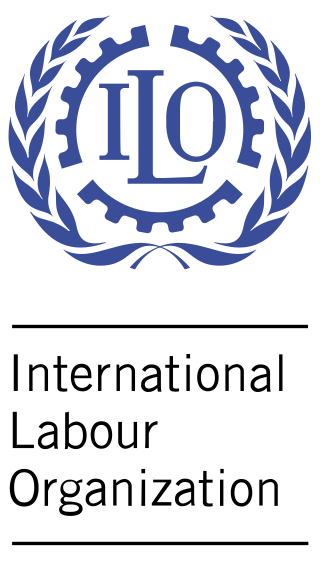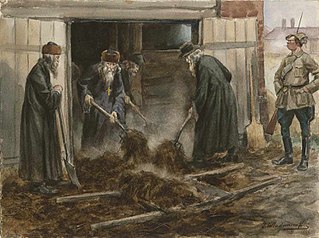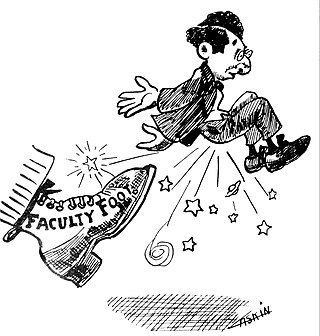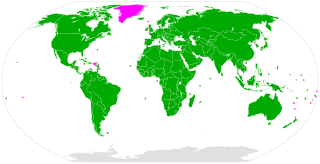
The International Court of Justice, or colloquially the World Court, is the only international court that adjudicates general disputes between nations, and gives advisory opinions on international legal issues. It is one of the six organs of the United Nations (UN), and is located in The Hague, Netherlands.

The International Labour Organization (ILO) is a United Nations agency whose mandate is to advance social and economic justice by setting international labour standards. Founded in October 1919 under the League of Nations, it is one of the first and oldest specialized agencies of the UN. The ILO has 187 member states: 186 out of 193 UN member states plus the Cook Islands. It is headquartered in Geneva, Switzerland, with around 40 field offices around the world, and employs some 3,381 staff across 107 nations, of whom 1,698 work in technical cooperation programmes and projects.
Labour laws, labour code or employment laws are those that mediate the relationship between workers, employing entities, trade unions, and the government. Collective labour law relates to the tripartite relationship between employee, employer, and union.

The Permanent Court of Arbitration (PCA) is a non-UN intergovernmental organization headquartered at the Peace Palace, in The Hague, Netherlands. Unlike a judicial court in the traditional sense, the PCA provides administrative support in international arbitrations involving various combinations of States, State entities, international organizations and private parties. The cases span a range of legal issues involving territorial and maritime boundaries, sovereignty, human rights, international investment, and international and regional trade. The PCA is constituted through two separate multilateral conventions with a combined membership of 123 Contracting Parties. The PCA is not a United Nations agency, but has been a United Nations observer since 1993.
Collective bargaining is a process of negotiation between employers and a group of employees aimed at agreements to regulate working salaries, working conditions, benefits, and other aspects of workers' compensation and rights for workers. The interests of the employees are commonly presented by representatives of a trade union to which the employees belong. A collective agreement reached by these negotiations functions as a labour contract between an employer and one or more unions, and typically establishes terms regarding wage scales, working hours, training, health and safety, overtime, grievance mechanisms, and rights to participate in workplace or company affairs. Such agreements can also include 'productivity bargaining' in which workers agree to changes to working practices in return for higher pay or greater job security.

Forced labour, or unfree labour, is any work relation, especially in modern or early modern history, in which people are employed against their will with the threat of destitution, detention, or violence, including death or other forms of extreme hardship to either themselves or members of their families.

Termination of employment or separation of employment is an employee's departure from a job and the end of an employee's duration with an employer. Termination may be voluntary on the employee's part (resignation), or it may be at the hands of the employer, often in the form of dismissal (firing) or a layoff. Dismissal or firing is usually thought to be the employee's fault, whereas a layoff is generally done for business reasons outside the employee's performance.
In legal terminology, erga omnes rights or obligations are owed toward all. Erga omnes is a Latin phrase which means "towards all" or "towards everyone". For instance, a property right is an erga omnes entitlement and therefore enforceable against anybody infringing that right.

A strikebreaker is a person who works despite an ongoing strike. Strikebreakers are either workers who cross picket lines to work or workers who were not employed by the company before the dispute but hired after or during the strike to keep the organization running. Some countries have passed laws outlawing strikebreakers to give more power to trade unions, other countries have passed right-to-work laws.

The Convention Concerning the Prohibition and Immediate Action for the Elimination of the Worst Forms of Child Labour, known in short as the Worst Forms of Child Labour Convention, was adopted by the International Labour Organization (ILO) in 1999 as ILO Convention No 182. It is one of eight ILO fundamental conventions.

Philippe Joseph Sands, KC Hon FBA is a British and French writer and lawyer at 11 King's Bench Walk and Professor of Laws and Director of the Centre on International Courts and Tribunals at University College London. A specialist in international law, he appears as counsel and advocate before many international courts and tribunals, including the International Court of Justice, the International Tribunal for the Law of the Sea, the European Court of Justice, the European Court of Human Rights and the International Criminal Court.

The Forced Labour Convention, the full title of which is the Convention Concerning Forced or Compulsory Labour, 1930 (No.29), is one of eight ILO fundamental conventions of the International Labour Organization. Its object and purpose is to suppress the use of forced labour in all its forms irrespective of the nature of the work or the sector of activity in which it may be performed. The Convention defines forced labour as "all work or service which is exacted from any person under the menace of any penalty and for which the said person has not offered himself voluntarily", with few exceptions like compulsory military service.
The Indigenous and Tribal Peoples Convention, 1989 is an International Labour Organization Convention, also known as ILO Convention 169, or C169. It is the major binding international convention concerning Indigenous peoples and tribal peoples, and a forerunner of the Declaration on the Rights of Indigenous Peoples.
Human rights in the Philippines are protected by the Constitution of the Philippines, to make sure that people in the Philippines are able to live peacefully and with dignity, safe from the abuse of any individuals or institutions, including the state.

The Legal Consequences of the Construction of a Wall in the Occupied Palestinian Territory of 9 July 2004 is an advisory opinion issued by the International Court of Justice (ICJ) in relation to the Israeli West Bank barrier.
Collective action in the United Kingdom including the right to strike in UK labour law is the main support for collective bargaining. Although the right to strike has attained the status, since 1906, of a fundamental human right, protected in domestic case law, statute, the European Convention on Human Rights and international law, the rules in statute have generated significant litigation. The "right of workers to engage in a strike or other industrial action" is expressly recognised in the Trade Union and Labour Relations (Consolidation) Act 1992 section 180, and has been recognised repeatedly by the Court of Appeal as "a fundamental human right"., and the House of Lords.
International labour law is the body of rules spanning public and private international law which concern the rights and duties of employees, employers, trade unions and governments in regulating Work and the workplace. The International Labour Organization and the World Trade Organization have been the main international bodies involved in reforming labour markets. The International Monetary Fund and the World Bank have indirectly driven changes in labour policy by demanding structural adjustment conditions for receiving loans or grants. Issues regarding Conflict of laws arise, determined by national courts, when people work in more than one country, and supra-national bodies, particularly in the law of the European Union, have a growing body of rules regarding labour rights.
National Union of Rail, Maritime and Transport Workers v United Kingdom [2014] ECHR 366 is a UK labour law case, concerning collective action and the right to take secondary action under ECHR article 11. It held that UK restrictions cannot be questioned on human rights grounds.
Labour rights in Azerbaijan are substantially constrained. Labor rights activists face repression in Azerbaijan. Azerbaijani law nominally allows the formation of labor unions and the right to strike, but in practice, most unions collaborate with the authoritarian regime, many categories of workers are prohibited from striking, and most major industries are dominated by state-owned enterprises where the government sets working conditions.











